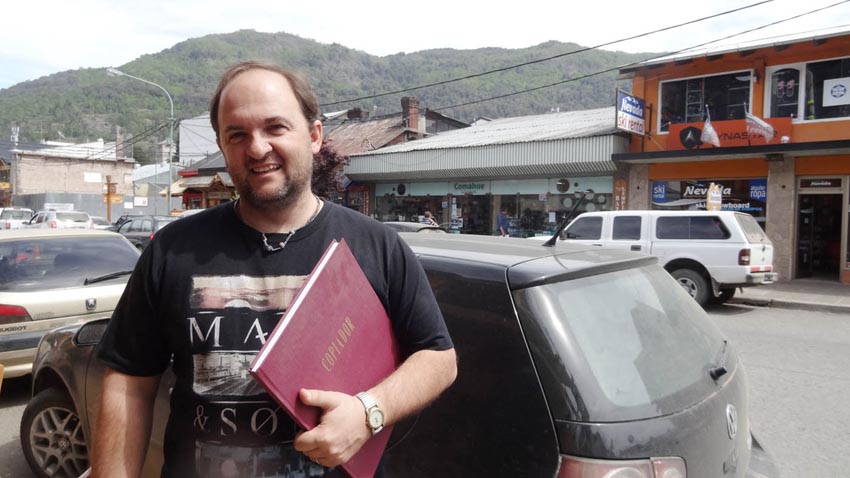Joseba Etxarri. Encased among the mountains and the shores of the intensely blue Lacar Lake, San Martin de los Andes is just a few kilometers from the Argentinean border with Chile and towards the east, crossing the desert, is five hours by car from Neuquen, capital of the Argentine province of the same name, its county seat. In this enclave the snow covered peaks have guarded this town that recently is enjoiying relief due to its touristic and natural beauty This is the place where a handful of Basque-Argentineans started a Basque club a year and a half ago. Manuel Bustingorry, 41 year-old from Neuquen is its president.
The sound of your last name indicates your Basque origin
-That’s right. I still don’t know where my grandparents left from, but three Bustingorry children arrived in Uruguay at the end of the 19th century. Of those, the sister stayed in Uruguay and the two brothers came to Argentina. One of them, my great-grandfather, decided to move with his wife, after a while to the south of Chile, where one of his cousin lived. That is how they came to this part of Patagonia, on the norder of the Rio Negro and Neuquen provinces where at one time, grandmother gave birth to my grandfather Manuel, who would acquire a lot of land, that is today flooded by the Ezequiel Ramos Mexia reservoir on the Limay river.
That area is well-known by the abundance of fossils and dinosaur remains.
-Here they have found the petrified remains of the largest dinosaurs known to date. As an anecdote, I will tell you that they found a lot of them on my grandfather’s land, and put his name on two of them. Now, a herbivore tyrannosaurus that was 26 meters long is now called a Bustingorrysaurus and the other, that was a carnivore, is called Skorpiovenator Bustingorryi. It’s a nice story, not everyone in the world can boast of having a couple of dinosaur namesakes (smile).
A year and a half ago, along with other Basque descendants, you founded a Basque club in San Martin de los Andes, the first one in the province of Neuquen.
-I was born here, and maybe because of my last name, or by certain customs that I saw in my father and now knowing the Basque culture a little more I can identify better, I always knew I was Basque. They raised me as Swiss, my mother’s origins, but my father always wanted me to wear a txapela. Two weeks ago, I participated in my first Semana Nacional Vasca Argentina, if my father, who died 14 years ago, had seen that, he would have died of joy. Before, we didn’t know, and we dedicated ourselves to work not knowing that we were surrounded by Basques. I fondly remember being in Bariloche when I was 20 and I met a girl who danced at the Basque club there; and there I tried some “squids Donostia style” at a community festival and I really liked them.
But why establish a Basque club?
-As I told you before, I always knew I was Basque but I didn’t know what it meant to be Basque. That is what I am learning with the Basque club now, and for my children. One of them is named Haizea, wind, because I also wanted it to be reflected in her name. We do this for our children and for ourselves. We started dance classes and we have brought dancers from Barioloche (3 hours away) and Bahia Blanca (11 hours away) to share our festival. We have shown Basque film and every activity that we carry out, makes us want to learn more and in learning share it with the rest of our neighbors, and with the rest of the members of other Basque communities. Ours is team work. The first event we held gathered 11 people. Today, we are 35 families, two of them that came from the Basque Country: Gorka Eskisabel from Donostia and Ander Seminario from Sarriguren, near Pamplona. They are our referents.
The enthusiasm that you display and how you do things is worthy of praise.
-The enthusiasm is a good motor. We want to take advantage of our time. We get together for a BBQ on the last Sunday of every month. Remember that San Martin de los Andes is a relatively young place, founded in 1898. There are more communities like Italians that have been organized for 22 years and there are some French, and I think some Portuguese, but during the parade this year, we were the only community and we paraded with the Argentinean flag and the Ikurriña. We have added 180 people at our last pintxo event…In October we inaugurated an exhibit, “Begirada eraldatzen – Transforming Looks” at the municipal hall, on equality with the collaboration of the Delegation of Euskadi in Buenos Aires. Now we are seeing how to include more youth, along with other Basque clubs in Patagonia. We are ambitious because we want to progress.






 Send to a friend
Send to a friend Add comment
Add comment








